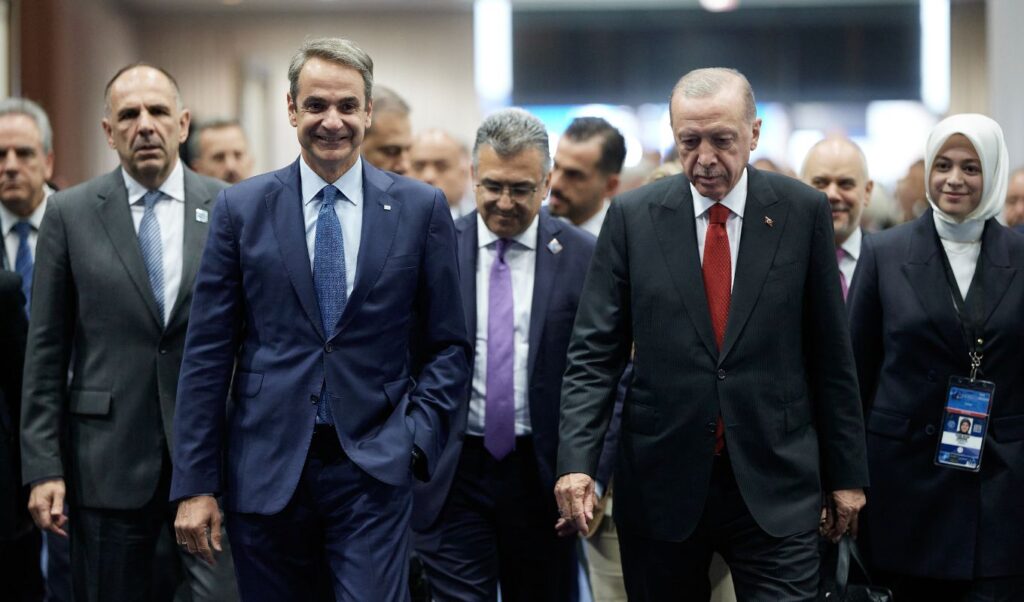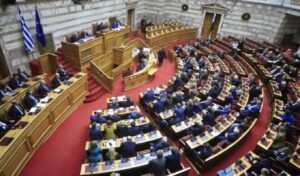The meeting between Mitsotakis and Erdogan, after repeated communications between the Maximos Mansion and the Turkish president’s office, had been scheduled for yesterday, Tuesday, at 2 pm New York local time (9 pm Greek time). It would have been the seventh meeting between Kyriakos Mitsotakis and Tayyip Erdogan in less than two and a half years, in an environment of significantly higher tension and stronger disagreements compared to previous occasions.
As the two leaders were arriving in the US, information had already begun circulating from Washington that Donald Trump was planning to meet with leaders and officials from many Muslim and Arab countries on Tuesday on the sidelines of the UN General Assembly to discuss the situation in the Gaza Strip and mainly the next day, after the end of the war. Shortly after, White House Press Secretary Caroline Leavitt told reporters that the US president would indeed hold a multilateral meeting with Saudi Arabia, the United Arab Emirates, Qatar, Egypt, Jordan, Turkey, Indonesia and Pakistan.
Mitsotakis-Erdogan meeting unlikely to take place
While no specific time had been officially announced, shortly after 8 am Tuesday (New York time), Erdogan’s associates informed Mitsotakis’s associates that it would coincide approximately with the scheduled meeting of the two leaders, which therefore had to be postponed. As government sources subsequently said, “a new time is being sought in the coming days in New York based on the schedule of both leaders.” A government source late last night expressed reservations about the final realization of the meeting. The chances of repeating the diplomatic contact appear limited, considering the extremely heavy schedule of the Greek prime minister for Wednesday. We also recall that tomorrow, Thursday, Tayyip Erdogan travels to Washington for the official meeting he will have at the White House with Donald Trump, where the issue of upgrading Turkey’s F-16 fighter jets and supplying F-35s will be on the negotiating table.
It is worth noting that the Turkish newspaper Sozcu had written that the meeting would take place in a heavy atmosphere, as tensions in the Aegean and Eastern Mediterranean cast their shadow over it, and argued that these issues “end the meeting before it even begins.” The clouds over the relations between the two countries had indeed thickened, however nothing indicated that Tayyip Erdogan would proceed with the postponement of the meeting, even if it is still not known whether he actually did so for the reasons highlighted by his office.
Milliyet’s version of the Mitsotakis-Erdogan meeting postponement and Athens’ response
The Turkish Milliyet gave its own version of the postponement (which is heading for cancellation) of the meeting. The newspaper’s report notes that “the proposal for a meeting between Erdogan and Mitsotakis came from Athens. The president’s foreign policy and security advisor, Akif Cagatay Kilic, discussed the matter with his Greek counterpart last week. Due to President Erdogan’s busy schedule, it was agreed to make an announcement after a possible meeting. However, the Greek side announced the meeting, violating the agreement. After this development, the meeting scheduled for today was postponed at Ankara’s request.”
However, a top government source from New York pointed out to Greek journalists that “during the organization of the meeting, our side was clear. We always pre-announce our meetings, Turkey usually does not pre-announce them. The appointment was absolutely arranged, it was agreed and we announced the meeting within the framework of the UN General Assembly.”
The same source also referred to the prospect of finally holding the meeting: “From then on, I don’t know if the meeting will eventually take place. I see it as very difficult at this moment, based also on the Prime Minister’s schedule, which is extremely heavy tomorrow (Wednesday). But even if it doesn’t happen, there will be an opportunity for the two leaders to talk at some other time. After all, the Prime Minister has already met seven times with President Erdogan and we always seek open channels of communication,” he characteristically stated.
Speaking to One television station, government spokesperson Pavlos Marinakis mentioned that the postponement was requested by the Turkish side and a common time is being sought for the meeting, noting that “the American President’s conference with Arab countries, to which Turkey’s President Recep Tayyip Erdogan was invited, was announced yesterday (Monday) without a specific time and after several hours the time was also announced, which is 1:30 pm New York time. As you understand, exactly on top of the scheduled meeting time of the two leaders.”
As opposition parties had already issued statements and were exercising harsh criticism of the government for the postponement (or cancellation) of the meeting, Marinakis responded as follows: “Let’s take the possibility that the postponement is diversionary for the eyes of the world, that he was looking to find an excuse, let’s accept it and it’s not a postponement, but a cancellation. What does this mean? It means that the opposition parties, in a move that would constitute a most inappropriate action, should take sides against the country and attack before they even properly learn what happened? Even if Turkey -hypothetically, not to be misinterpreted- cancels the meeting. What does this mean? That the government should apologize? Could it mean that our stance and positions are annoying?”
Earlier, Dimitris Mantsos from PASOK had stated that “the postponement of the Greek prime minister’s meeting with the Turkish President at the request of the Turkish side sends wrong messages at a critical geopolitical juncture for bilateral relations, but also the broader situation in the Eastern Mediterranean,” while Rena Dourou from SYRIZA emphasized that this postponement “brings to the forefront again Greece’s marginalization to which the government’s opportunistic foreign policy, without coherent national strategy, has led.”
One of the “thorns” in Greek-Turkish relations is of course the electrical interconnection project between Greece and Cyprus with an undersea cable and it has special significance that in the meeting that took place in New York between Kyriakos Mitsotakis and Nicos Christodoulides, the two leaders and the two governments reiterated that they “remain absolutely committed to the implementation of this project of strategic importance, as well as the President of the European Commission and the President of the European Council, who are fully informed and support the project’s implementation.”
Erdogan’s messages from the UN General Assembly podium
The messages that Erdogan wanted to convey to Athens and Nicosia he chose to send from the UN Assembly podium. In his speech, he said that projects that exclude Turkey and the “Turkish Republic of Northern Cyprus” (the pseudo-state) in the Eastern Mediterranean will not succeed. “We want to see the Aegean and Eastern Mediterranean as a basin of stability and prosperity where the legitimate interests of all sides are respected,” said the Turkish president and declared that his country is ready for “constructive cooperation,” mainly on energy and environmental issues, noting that “we expect the same from our neighbors.”




